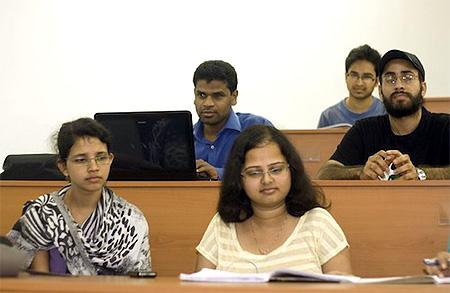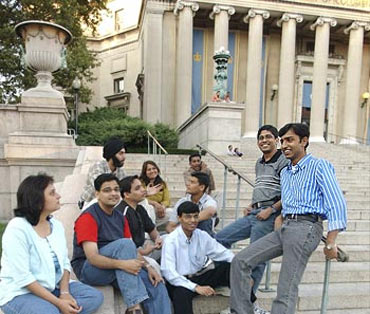
In an exclusive interview with PaGaLGuY, K Ramkumar, executive director (human resources, customer service and operations) at ICICI Bank voices his views about the importance of MBA classroom diversity from a recruiter's perspective, where b-schools are going wrong and what they could do better.
These days b-schools are getting proactive about gender and educational diversity in their classrooms. What do you think of this?
A large part of the focus of business management education is towards building business leaders of tomorrow. So we need to enhance management education with that vision in mind. Currently, management education is still operating with a 19th century outlook because of the widespread belief that women are not interested in entering the profession. My scepticism arises from the fact that if we take the statistics of undergraduation courses, almost half the batches comprise females. In such a scenario, on what basis can it be said that these women are not aspirational or not ambitious enough to want to become managers? Even the best b-schools of the country are running on average class divisions of 12-15% females in their batches. I feel it is extremely difficult to impart complete managerial values with such a ratio and I have not yet come across any dean or director of top b-schools who has addressed the reasons behind this in a convincing manner.
One of the prime reasons behind this phenomenon is that the b-school selection process is unnecessarily oriented towards mind-bending quant. B-schools today have pre-selected their students through their selection processes. It is extremely difficult for non-engineers and those who are unable to afford expensive CAT coaching classes to manage top percentiles. Through this criterion, b-schools seem to be making the statement that both men and women who come from arts, commerce, economics and other non-engineering backgrounds are unsuitable to be business leaders. B-schools and students need to understand that this debate is not about not including engineers, but it is about excluding the others. I believe that engineers are extremely insightful and would make good business leaders but we also need to consider others from the talent pool that our country has to offer.
A class that does not have students from various disciplines studying together is going to be one with very limited perspectives. People bring views on the basis of their academic exposure. On the other hand, not having a good male-female ratio also restricts the scope of idea exchanges during classroom sessions and that is even felt when they enter the industry.

How much does diversity matter to you as an employer and to what extent?
If we talk about the industry, the major points of concern are how do we bring more diversity into the workforce as well as how do we make workplaces friendlier and more accessible to women. Even though there are a considerable number of females in non-management workforces, the number shrinks as soon as we track managerial jobs in any company.
The main reason behind this is the fact that the supply force for these jobs are the b-schools. If b-schools have female-unfriendly selection criteria, then even if companies try to implement policies that are favourable to women, we will not be able to increase our female workforce by a great degree.
Directors and governing boards of b-schools need to analyse the way in which they can tweak their selection criteria in order to provide more access to women in management classrooms. I would like to question the authorities at various b-schools that despite having every facility at their disposal, why are they unable to change the admission criteria?
The industry is now being put under the scanner about the limited number of females in their workforce. It is not correct to say that all the intelligent people in the world choose to go into the field of engineering. Today, it would be difficult for anybody to point out towards one particular industry and say that they are discriminatory in their recruitment policy. Thus, the onus is on the b-schools to provide the industry with a diverse group that would help the industry grow.

At the workplace, do you notice any difference between MBA graduates from diverse classrooms and those from male and engineer-dominated classrooms?
First of all, it is not coincidental that an Indian Institute of Management (IIM), Kozhikode, has managed to get a high percentage of female students in its classrooms. Geography plays a major role in this aspect. In addition to the overall favourable gender ratio in the state of Kerala, it is a known fact that women are more comfortable going to the south of the country, especially to Kerala, to pursue their education. This is one of the major reasons why some of the institutes are managing to get a good male-female ratio.
As to the question of difference in the quality of students from a diverse group, as opposed to a non-diverse group, it is extremely difficult to analyse this as of now. Till now, not many institutes offer the kind of diversity for us to recruit them and make such comparisons. However, I can tell you that having worked in both male-dominated and diversity-rich groups, I have found that the latter is always more capable of comprehending issues and being more flexible in looking at options. On the contrary, non-diverse groups have a certain ideology and they are unable to look at options beyond their own limited paradigm.
If a person is quant-oriented and a problem presents itself, this person will only look at the quant-type solutions to the issue. On the other hand, a non-quant person will analytically look at other aspects that would balance the quant part of the problem. In such a situation, the probability that the entire data is comprehended well and diverse decisive steps are made will be extremely high. This is the reason why at ICICI, we value not only gender diversity, but also ethnic, age, education qualification diversity.
Vernacular diversity is something we are trying to include in our organisation as well. There are lots of bright people in the country who despite having studied the English language are necessarily not very good in speaking it. Obviously, such people who come from semi-urban or rural places where English is not the prime medium of education, will not perform very well in group discussions and admission interviews.
I am not saying that English is not required, but only that the language can be learnt. However, they already have the most important qualifications which include intelligence and attitude.
The semi-urban and rural markets are constantly on the rise today. It will be extremely difficult for a person who has never lived in a village to understand the mindset of his or her customers in these areas. Majority of the organisations do not have representation from people who understand these market sectors. If the diversity structure at the management level were to include a lot more people from the rural and semi-urban markets, we would be able to bring more relevant products that would assist these customers in a much better manner. So we should not get caught at just one level of diversity.
I would also like to question b-school claims that they are unable to increase their batch strength, which is another reason why they are not able to increase diversity in the institutes. I would like to share an example in this matter.
There used to be an extremely popular restaurant in Bangalore. They took pride in their small infrastructure and the fact that there was a long waiting queue outside their premises. Indian business schools are functioning in a similar manner in the sense that they claim that they cannot increase their class sizes in the fear of affecting the quality of students. This is equivalent to saying that we cannot scale up and maintain quality at the same time, which does not make much sense. We know that the highest ranked companies in the world bring both scale and quality.
In Harvard, Michigan or Wharton, there are on an average thousands of students graduating each year. In such a case, for Indian b-schools to say that despite having the infrastructure and teaching capability they are unable to increase their intake is not acceptable. One of the major reasons that I feel b-schools are apprehensive in accepting more students is the fact that their average placement salaries will go down. This will make them less attractive for the next generation.

What could b-schools do better in order to prepare students for improved adaptation and performance in their professional lives?
The first thing that b-schools need to do is try and shift away focus from the placements. In fact, it has been suggested that b-schools stop acting as placement agencies altogether. Even in places like Harvard, students are instrumental in searching for jobs themselves.
The same strategy needs to be applied by Indian b-schools as well. B-schools should be reverted to being educational centres. Another step would be to bring about a change in the selection criteria of the b-schools, which I have discussed on various platforms earlier. The catch here is to find those b-schools which are ready to do things differently from the standard procedures.
Unfortunately, the top b-schools in the country have not yet shown any aptitude to follow the unchartered path.

As an employer, what qualities do you look at in students during the recruitment process?
Speaking on behalf of ICICI, we believe that passion is non-negotiable. However, I clearly specify the difference between passion and an over-enthusiastic passion. Both form a completely different mettle of students.
When we go out, we know how to take the correct measure of people and passion is an important quality that we consider. Another important quality that we consider is the outlook of management students towards problem solving. They need to have the confidence which says that they have a smart mind and an open heart and they will be able to tackle any problems that are thrown their way.
We also like to hire those people who are good at engaging with other people. It is not enough to be good with computers only. You should be willing to work on a computer, but we prefer people who like to spend more time with people than with computers. Finally, we look for people who can balance their ability to work with numbers and also to ideate. We want people who are willing to ideate and not just spend time making spreadsheets.

Which of these qualities are b-schools in general imparting well and which are they not?
As of now, a large number of b-schools in the country are not focussing on developing leadership skills or the business leader perspective. The best and the brightest students are anyway getting into top b-schools of the country. We essentially look at the attitude of the students beyond how they have been moulded by the b-schools. In fact, one of my major worries with respect to b-schools is the fact that majority of them are excessively focussed towards academic excellence. The best example would be that you are a business school and you are still giving a paper-pencil test to measure the development of the person's managerial skills.
B-schools still grade people in a manner similar to undergraduate schools, that is on the basis of a memory reproduction. Today, b-schools are only an extension of undergraduate schools where people are graded for theoretical excellence. They need to create a curriculum and evaluation methodology that would help them create a manager-leader.

How much does training of MBA recruits help in making up for these deficiencies?
...even from the top b-schools, to be eligible to be called a manager.
It takes us that much time to make them unlearn some of the things they are taught at the b-schools and learn relevant things. So it is only two years after they graduate from b-schools that people become managers.
In the first year, some of them have problems in accepting the change, but during the second year they understand the relevance of change and adapt to their surroundings in the second year.